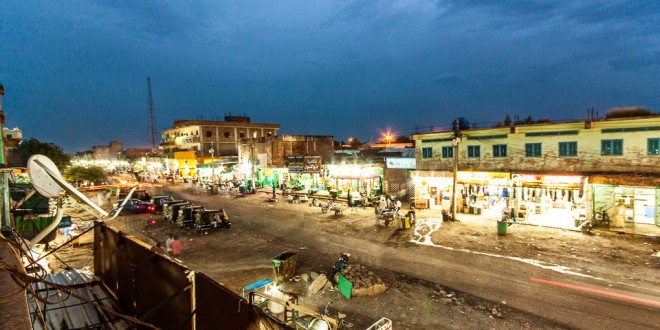(28 August 2017) Sudanese authorities should ensure police violence against a blind disability rights activist and trade unionist, Mohamed Nasser, in Al Gedaref is promptly and impartially investigated and that those responsible are brought to justice. Immunities for officials granted under the Police Act of 2008 should be lifted to enable a criminal investigation ordered by the Office of the Prosecutor into the excessive use of force to proceed. A medical report was obtained by Mohamed Nasser confirming the presence of bruises.
Trade unionist and blind disability rights activist Mohammed Ibrahim Adam Nasser was beaten in the street by a group of Popular Police officers (al-shurta al sha’biya) when he refused to stop for them. Mohamed Nasser, who walks with the assistance of a white cane, reported that he failed to stop when instructed to do so because he feared for his safety.
The incident took place on 24 July 2017 at around 11.30am whilst Mohammed Nasser was walking through his local neighbourhood in Al Gedaref city, the capital of Al Gedaref state in eastern Sudan. One officer grabbed him from behind and then he was set upon by a number of others who grabbed his hands, legs, neck and waist. His clothing and the bag he was carrying were torn and he sustained severe bruising. He was then taken in a vehicle to the Popular Police building where he was punched and slapped along the way.
When he arrived at the Popular Police building in Al Gedaref , Mohamed Nasser was informed of a warrant for his arrest and for the arrest of another blind activist, Mr. Ahmed Elnoor. The warrant related to a complaint made by the Chairperson of the Blind Person’s Union in Al Gedaref, Mr. Mohamed Awad, accusing Mohamed Nasser and Ahmed Elnoor under articles 77 (Public Nuisance) and 160 (Insult and Abuse) under the Sudanese Criminal Act of 1991. The complaint lodged by the Chairperson was prompted by an earlier complaint the two activists had made before Sudan’s Humanitarian Aid Commission (HAC) – the body that regulates non-governmental organisations in Sudan – in April 2017, alleging that Chairperson Mohamed Awad had retained his position for over twenty years in breach of the statute of the union. After being informed of the charges against him, Mohamed Nasser was transferred to the Industrial Police Department, the department responsible for policing the industrial area in Al Gedaref, and was held in a cell for three hours prior to his release on bail.
The following day, 25 July, Mohamed Nasser filed a criminal complaint about the police violence with the office of the Prosecutor. The Prosecutor filed a complaint against the police under articles 142 (hurt) and 159 (defamation) of the 1991 Criminal Act and submitted it to Al Awsat Police Station in Al Gedaref, ordering a criminal investigation to be launched. The complaint was then forwarded to the Industrial Police department, and the Director of Legal Affairs for the Industrial Police authorised the complaint.
On 26 July, Mohamed Nasser obtained Criminal Form 8, a standardised medical evidence form used in criminal proceedings related to death or grievous hurt, from the police and underwent a medical examination at a hospital that confirmed the presence of bruises but not internal injuries.
Mohamed Nasser has since visited the police station and sought information about the progress of his complaint to no avail. On one occasion he was reportedly informed by an officer working in the Legal Affairs department that, “we are not afraid of your complaint and you can write whatever you want but you will never arrive at a result”.
Members of the Sudanese Police forces enjoy immunity from criminal prosecution under the Police Act of 2008. The law provides that an official cannot be subject to criminal or civil sanctions without prior authorisation of the head of the police force (or someone exercising delegated powers). The granting of immunities for officials is deeply engrained in Sudanese law and practice and ACJPS has documented countless cases where immunity provisions have prevented access to justice for the victims of crimes perpetrated by state officials.
Although a police file has been opened in Mohamed Nasser’s case, the approval of the Director of the Police Forces in Sudan is required for the accused police officers to be interrogated and for the investigation to proceed.
ACJPS calls for the immunities enjoyed by the police in the present case to be lifted and recalls the basic principles set out in African regional and international law that when there are allegations of excessive, arbitrary or abusive use of force by police or of acts of torture or other ill-treatment, the authorities must ensure there are effective and impartial investigations into those allegations. Police must not be exempted from criminal liability for unlawful acts committed in the course of duty.
Background
The popular police (al-shurta al sha’biya) is a parallel police force comprised of members of local communities who are ideological supporters of the government.
Mohamed Nasser, 27 years of age and a resident of Al Fardous neighbourhood in Al Gedarif town, is a known trade unionist and disability rights activist. He presents a television (TV) programme on Al Gadarif TV that seeks to raise awareness about the rights of the persons with disabilities and promotes their integration in local communities.
A police detective had attempted to stop Mohamed Nasser earlier in the month, on 13 July 2017, in the Al Fardous neighbourhood of Al Gedarif whilst he was on his way to work at Al Gadarif TV. On that occasion the police detective requested that Mohamed Nasser get in the police vehicle and report to Al Awsat police station but he refused.
Contact: Mossaad Mohamed Ali, ACJPS Executive Director: +256 779584542 / Katherine Perks, ACJPS Programme Director: +1 519 551 8084 or info@acjps.org.
 African Centre for Justice and Peace Studies ACJPS | المركز الافريقي لدراسات العدالة و السلام
African Centre for Justice and Peace Studies ACJPS | المركز الافريقي لدراسات العدالة و السلام




